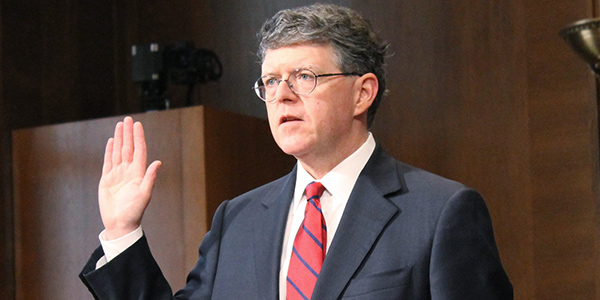By Rich Heidorn Jr.

FERC Commissioner Bernard McNamee told Senators at his November confirmation hearing that he would consult with ethics lawyers on whether he should recuse himself from the commission’s resilience dockets. | © RTO Insider
Environmental groups asked Tuesday that new FERC Commissioner Bernard McNamee recuse himself from the commission’s resilience dockets because of his advocacy for coal and nuclear plants during his time at the Department of Energy.
The motion by the Natural Resources Defense Council, Sierra Club and Union of Concerned Scientists echoed concerns Senate Democrats expressed during McNamee’s confirmation hearing in November (RM18–1, AD18-7). McNamee was sworn in on Dec. 11 after winning confirmation on a 50-49 party line vote.
McNamee’s role in DOE’s Notice of Proposed Rulemaking and the agency’s second proposal, to save at risk generators under the Defense Production Act, “create the appearance that Commissioner McNamee has prejudged central matters of law and fact that remain at issue in these proceedings,” the environmental groups wrote.
As Deputy General Counsel for Energy Policy at DOE, McNamee signed the NOPR, which asserted that “[t]he resiliency of the nation’s electric grid is threatened by the premature retirements of power plants that can withstand major fuel disruptions caused by natural or manmade disasters.” The NOPR proposed eligible fuel-secure units within PJM, NYISO, MISO and ISO-NE receive “full recovery of costs,” including a return on equity, arguing wholesale pricing in organized markets “does not adequately consider or accurately value” resiliency benefits of fuel-secure generators.
McNamee also worked on DOE’s second proposal, which asserted that “retirements of fuel-secure electric generation capacity across the continental United States are undermining the security of the electric power system because the system’s resilience depends on those resources.”
The environmental groups cited a series of court rulings outlining the circumstances in which recusal is required. “Due process considerations require that an adjudicator `who participates in a case on behalf of any party, whether actively or merely formally by being on pleadings or briefs, take no part in the decision of that case by any tribunal on which he may thereafter sit,’” they wrote, quoting from a 1958 D.C. Circuit Court of Appeals ruling.
The groups also noted FERC’s rejection of the DOE NOPR (RM18-1) is still subject to rehearing request by the Foundation for Resilient Societies. “McNamee’s participation in these rehearing requests would violate the venerable prohibition against a man standing in judgment of his own cause, and due process,” the groups said, adding that McNamee also should recuse himself from the resilience docket the commission opened in January when it rejected the NOPR (AD18-7).
‘Same Factual Questions’
“The resilience docket therefore encompasses the very same factual questions that were answered by the department, and by Commissioner McNamee on behalf of the department, in the DOE NOPR: whether the grid is threatened by retirements of so-called `fuel secure’ power plants and whether and to what extent such `fuel secure’ resources are necessary to the reliability and resiliency of the grid… The mere technicality that the two proceedings have different docket numbers, where the substantive matters at issue are materially the same, does not make the resilience docket a sufficiently distinct matter for the purposes of the due process inquiry.”
The groups cited comments filed Dec. 6 by the Harvard Electricity Law Initiative, which also questioned McNamee’s impartiality. “His recusal must extend beyond these two dockets,” wrote Ari Peskoe, the director of the law project. “The NOPR’s sweeping conclusions prejudge issues that could appear before the commission in ratemaking proceedings. This prejudgment is substantially different from a commissioner’s public statements about policy issues, which the commission has recently determined were not a basis for recusal.”
In his confirmation hearing, McNamee said he would consult ethics lawyers on whether he should recuse himself from the resilience dockets. (See Democrats Urge McNamee’s Recusal from Resilience Docket.)
Democrats also were alarmed by comments McNamee made in a videotaped speech in February after briefly leaving DOE and working for a conservative think tank’s project to “reframe the national discussion” about fossil fuels. McNamee said renewables are disruptive to “the physics of the grid” and described environmentalists’ activism against fossil fuels as a “constant battle between liberty and tyranny.”
After the video became public, Sen. Maria Cantwell of Washington, the ranking Democrat on the Energy and Natural Resources Committee, questioned McNamee in writing about his comments, asking: “How can environmental groups possibly expect a fair shake from you as a FERC commissioner?”
McNamee responded: “I understand the difference between being an advocate and an independent arbiter.”
McNamee and FERC Chair Neil Chatterjee declined to comment on the recusal motion.
Comments Filed
McNamee replaced former Commissioner Robert Powelson, who joined in FERC’s 5-0 vote rejecting the DOE NOPR and opening the new resilience docket in January. The commission has received two rounds of comments in the new docket, including a June request by FirstEnergy for an emergency order to preserve fuel-secure generating resources. (See RTO Resilience Filings Seek Time, More Gas Coordination and Don’t Rush on Resilience, Commenters Urge.) The commission has given no indication of what it will do, if anything, in response.
The Trump administration reportedly dropped DOE’s second proposal this fall. (See Chatterjee Dodges as DOE Spins on Coal Bailout.)
But the resilience concerns the department raised haven’t gone away. On Dec. 17, PJM issued a report calling for payments for fuel-secure generation. (See Full PJM Study Makes Case for Fuel Security Payments.) On Dec. 18, NERC issued a warning that quicker-than-expected retirements of coal and nuclear plants could undermine reliability. (See NERC Releases ‘Stress Test’ Analysis of Gen Retirements.)




